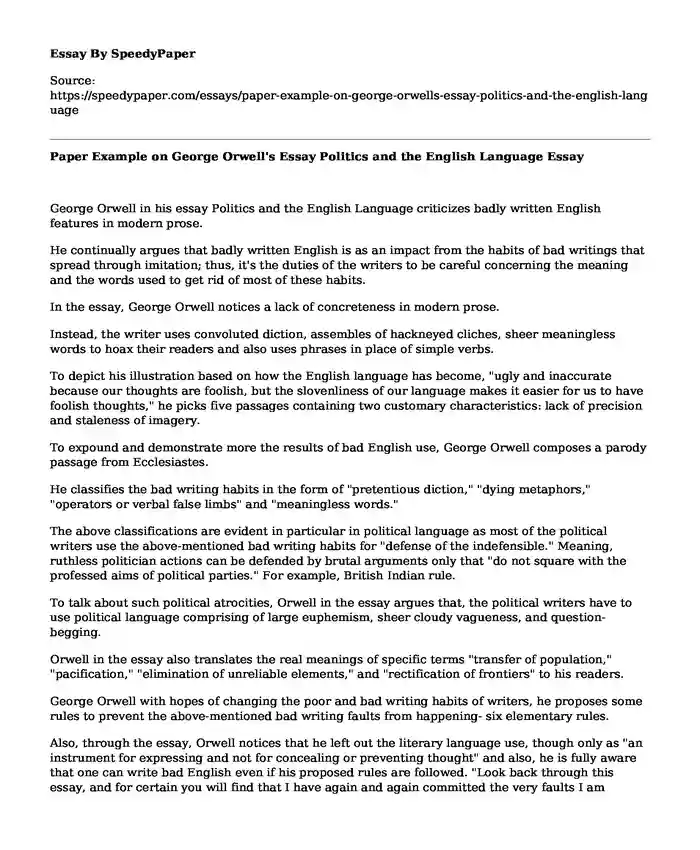
| Type of paper: | Essay |
| Categories: | English literature Politics Languages George Orwell |
| Pages: | 3 |
| Wordcount: | 791 words |
George Orwell in his essay Politics and the English Language criticizes badly written English features in modern prose.
He continually argues that badly written English is as an impact from the habits of bad writings that spread through imitation; thus, it's the duties of the writers to be careful concerning the meaning and the words used to get rid of most of these habits.
In the essay, George Orwell notices a lack of concreteness in modern prose.
Instead, the writer uses convoluted diction, assembles of hackneyed cliches, sheer meaningless words to hoax their readers and also uses phrases in place of simple verbs.
To depict his illustration based on how the English language has become, "ugly and inaccurate because our thoughts are foolish, but the slovenliness of our language makes it easier for us to have foolish thoughts," he picks five passages containing two customary characteristics: lack of precision and staleness of imagery.
To expound and demonstrate more the results of bad English use, George Orwell composes a parody passage from Ecclesiastes.
He classifies the bad writing habits in the form of "pretentious diction," "dying metaphors," "operators or verbal false limbs" and "meaningless words."
The above classifications are evident in particular in political language as most of the political writers use the above-mentioned bad writing habits for "defense of the indefensible." Meaning, ruthless politician actions can be defended by brutal arguments only that "do not square with the professed aims of political parties." For example, British Indian rule.
To talk about such political atrocities, Orwell in the essay argues that, the political writers have to use political language comprising of large euphemism, sheer cloudy vagueness, and question-begging.
Orwell in the essay also translates the real meanings of specific terms "transfer of population," "pacification," "elimination of unreliable elements," and "rectification of frontiers" to his readers.
George Orwell with hopes of changing the poor and bad writing habits of writers, he proposes some rules to prevent the above-mentioned bad writing faults from happening- six elementary rules.
Also, through the essay, Orwell notices that he left out the literary language use, though only as "an instrument for expressing and not for concealing or preventing thought" and also, he is fully aware that one can write bad English even if his proposed rules are followed. "Look back through this essay, and for certain you will find that I have again and again committed the very faults I am protesting against," he states.
His essay provides an essential step forward towards the regeneration of political language even though the transition might be slow; George Orwell believes it will be beneficial and effective.
George Orwell concludes: "Political language-and with variations, this is true of all political parties, from Conservatives to Anarchists-is designed to make lies sound truthful and murder respectable, and to give an appearance of solidity to pure wind."
George Orwell uses the essay as a base of argument in his other novels: Nineteen Eighty-Four in Newspeak, Big Brother and the Ministry of Truth and Animal Farm in Squealer and the pigs of Napoleon.
His conclusion in the essay is less bleak compared to the other two novels conclusions as in the two mentioned novels; language damage is irreversible.
In the essay Politics and the English Language, he is calling his readers to action.
He argues that bad habits in the English language spread by imitation "can be avoided if one is willing to take the necessary trouble."
In the end, he asserts that "one can even, if one jeer loudly enough, send some worn-out and useless phrase . . . into the dustbin where it belongs." Thus, showing him, still calling for action from his readers.
Till today, Orwell 1946 essay Politics and the English Language is still calling out for actions from its readers.
Conclusion
The main point in the essay Politics and the English Language that I agree with totally is that the language of politics is designed to trick people by making lies sound truthful. This point still seems valid to today happenings given Orwell wrote the essay of a century ago. On the other hand, I much disagree with his argument concerning modern English tendency towards "Latinization." Even though in Orwell's times, overtly nonsensical and deceptiveness was increasing at a rapid rate mostly in political writing, generally English language was simple both style and wording that is depicted in the 19th century. In comparing the post-1920 world with that of Victorian prose sample, it's evident and clear that Greek and Latin roots were used in wording more in the older styles hence loftier (more of formal sounds than recent writings). The Latinization issue has little impact on deceptiveness in political writing, in my point of view.
Work Cited
Orwell, George. "Politics and the English language." (2003).
Cite this page
Paper Example on George Orwell's Essay Politics and the English Language. (2022, Dec 11). Retrieved from https://speedypaper.com/essays/paper-example-on-george-orwells-essay-politics-and-the-english-language
Request Removal
If you are the original author of this essay and no longer wish to have it published on the SpeedyPaper website, please click below to request its removal:
- Essay Sample on Medical Imaging Segmentation
- Free Essay on Methodologies of Software Development
- Essay Sample on Driving and Texting Affection
- Free Essay Sample on Anthropologist Racism
- Paper Example on Political Film Project
- Paper Example on Evidence-Based Analysis (CT)
- Paper Example - Health Reform Bill
Popular categories




